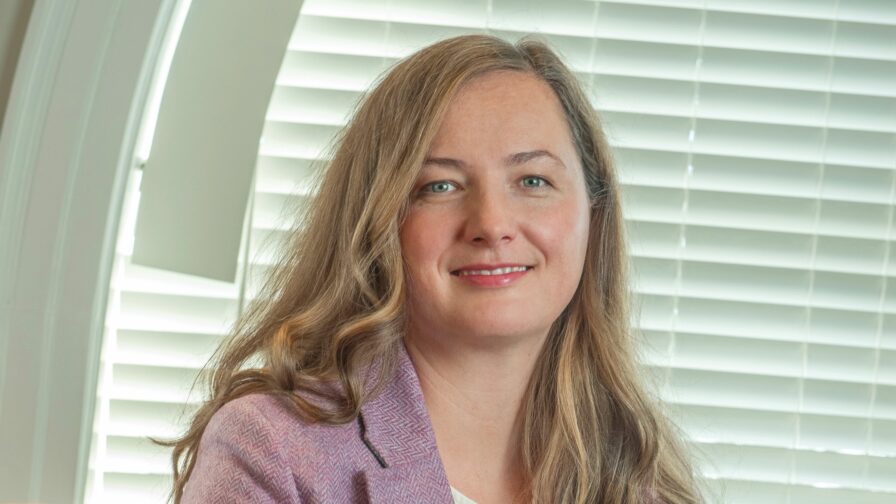
Professor Tatiana Batova: Uncovering Clues to Cross-Cultural Communication
Tatiana Batova was a young graduate student when she submitted her first research paper to the journal Technical Communication in 2010. It’s success was immediate. Instead of simply being accepted for publication, her examination of legal, linguistic and cultural issues in medical communications won the Frank R. Smith Outstanding Journal Article Award from Society for Technical Communication, establishing her reputation as an outstanding researcher in her field.
As a professor at Arizona State University, Batova continued to thrive in her ongoing examination of language and technology in cross-cultural communications. Numerous awards followed, and she received tenure in 2019.
But something was missing.
“I started, way back in the day, wanting to be a teacher,” Batova says. “I really wanted to be in a place that values teaching more. I didn’t want to leave my research behind, but I wanted to have more interaction with students. Darden seemed to combine both. You can still do research, but teaching is elevated.”
The move to Charlottesville to join the faculty in the Communication area, however, wasn’t easy.
“I was one of the last two people to be offered jobs before the pandemic hit,” Batova remembers, and she had to remain in Arizona for an extra year with her “mind just kind of split between the two schools.” When she finally did start at Darden, she saw students — as well as faculty and staff colleagues — only on Zoom or in masks.
As the School emerged from the restrictions of the pandemic, her vision of research and teaching complementing each other came to fruition. Finally seeing student faces clearly, she mastered teaching with the case method. She delivered core instruction in leadership communication and developed dynamic electives to help Darden students understand how to factor in linguistic and cultural factors into e-commerce, digital marketing and storytelling with data. “At Darden, teaching feeds into research, and research feeds back into teaching,” she says.
The strength of Batova’s work comes from her ability to discover how unexamined assumptions and practices can undermine effective communication in a wide variety of situations. Context, especially linguistic and cultural context, is critically important. In an increasingly interconnected world, understanding these factors is a non-negotiable skill for business leaders.
“A lot of what you translate doesn’t resonate with people because the concepts are different, and the frames of reference are different,” Batova says. “The way we talk about AI in the U.S., for example, is very different from the way people talk about AI in Germany. The frame of reference is different. The regulations are different. The mindset is different. There are two completely different discourses.”
That’s important, for one, because how we talk about technology can influence whether we want to use it or not, as well as our work motivation, according to Batova. To better understand the “rhetoric of technology,” she combines quantitative user experience with exploratory qualitative methods.
In her elective on storytelling with data visualization, her research plays a vital role in the classroom, making students partners in examining the implications of her findings. “I’ve been working on a project on cross-cultural data visualization because nobody has empirically tested a lot of assumptions,” she says. In the United States, for instance, users tend to look at the title of a chart first, which frames their understanding of the data. But in India, “everybody went straight to the chart and kind of wanted to draw their own conclusion. The title was secondary. So what does that mean for being persuasive?” As she fields new studies in Serbia and China, she finds that “students want to talk about this. They’re asking about it. It’s really exciting to bring new research back into the classroom so we can discuss it.”
For Batova, her research agenda and her love of teaching are inseparable, driving an exploration of how humans communicate using an ever-evolving set of tools in a rapidly changing world. Darden allows her to put both of those pieces of the puzzle together in a way that helps answer the key questions and make a practical impact.
“The great thing about Darden is you can chart your own course.”
The University of Virginia Darden School of Business prepares responsible global leaders through unparalleled transformational learning experiences. Darden’s graduate degree programs (MBA, MSBA and Ph.D.) and Executive Education & Lifelong Learning programs offered by the Darden School Foundation set the stage for a lifetime of career advancement and impact. Darden’s top-ranked faculty, renowned for teaching excellence, inspires and shapes modern business leadership worldwide through research, thought leadership and business publishing. Darden has Grounds in Charlottesville, Virginia, and the Washington, D.C., area and a global community that includes 18,000 alumni in 90 countries. Darden was established in 1955 at the University of Virginia, a top public university founded by Thomas Jefferson in 1819 in Charlottesville, Virginia.
Press Contact
Molly Mitchell
Associate Director of Content Marketing and Social Media
Darden School of Business
University of Virginia
MitchellM@darden.virginia.edu

